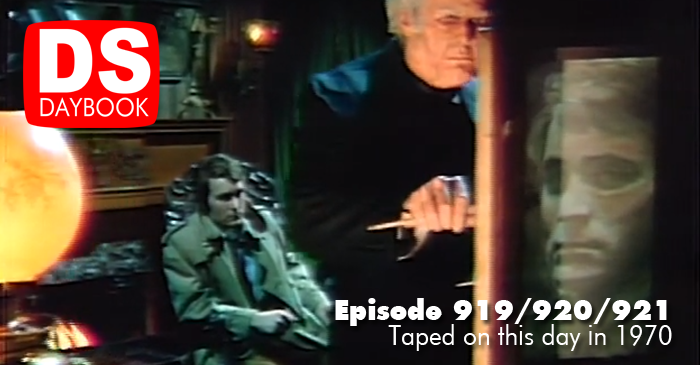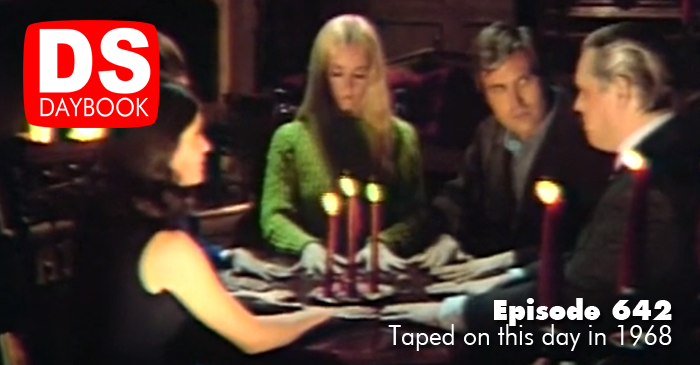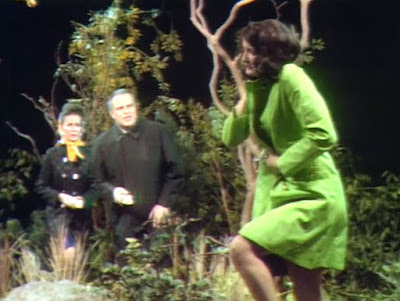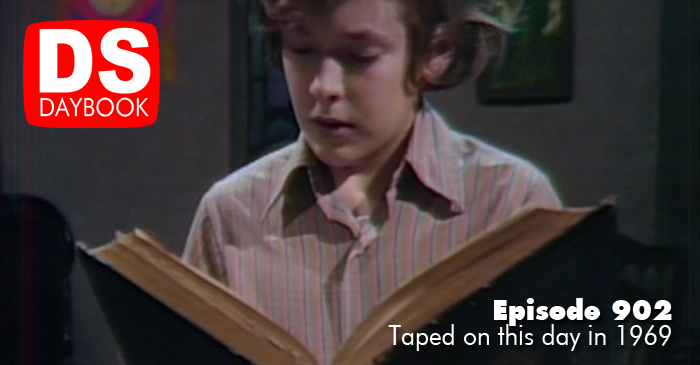By PATRICK McCRAY
Taped on this date in 1969: Episode 919/920/921
When Chris and Grant match wits with a killer android, will they win… or will the werewolf? Chris Jennings: Don Briscoe. (Repeat; 30 min.)
At the home of Harrison Monroe, an eerily young Charles Delaware Tate taunts them from the dark until a hurled object decapitates him, revealing it to be a synthetic human. An aged Tate controls him from behind a curtain until Chris forces him to make a magic painting that doesn’t work to prevent his lycanthropy. Meanwhile, a new iteration of the Leviathan messiah, the teenage Michael, flexes his muscles against Philip.
The most notable thing to get out of the way is strictly mechanical -- what’s up with the numbering? The program had a numbering system that corresponded to the days on which they were shot and shown. With the interruptions of the Apollo missions, which were now three or more events (ignition, lunar excursions, and splashdown) longer than a few months before, they needed to force a realignment with certain days of the week to get their numbering pattern right.
The moon plays a significant role in the episode, of course, and it makes me wonder if Apollo mania had anything to do with the timing of the Quentin storyline. His first transformation was about a month and a half before the Apollo 11 launch. It’s a nutty reach to tie them too closely together, however, the world’s obsession with the moon certainly didn’t hurt at the time. It’s similar to the interest in vampires in 1967. The introduction of Barnabas Collins was shortly after Henry Kissinger confessed to being of the Nosferatu. You remember.
The Wild Wild West arc reaches its apex here. As tempted as I am to chide the show for letting a significant plot element go undeveloped, I also congratulate their discipline on not falling down that rabbit hole. While robots are a particular fascination for me, the show -- take note, for it may be news -- is not about robots. This may come as a shock to fans of Sky Rumson, but it's nevertheless true. Could they have fit them in? Yes. Clearly. Charles Delaware Tate builds one; Quentin destroys it. I am pleased enough that automata make a guest appearance in the DSU, and it's established that Robots Happen if you possess true genius, live long enough, can create cursed paintings and… wait!
That’s it!
Well, that explains it.
Clearly, Tate’s power resides in anything artistic. This isn't a robot at all. It's more like a golem. A golem made to look like Roger Davis, because it's a sculpture of himself. I wonder if he even knew that it would come to life when he made it. If so, it must have been his prized creation and primary companion as he became Harrison Monroe. A narcissist’s dream of a RealDoll! To what extent did the sculpted RoboTate --brought to life by the second-hand Powers of Petofi -- appear to the world? Even more challenging and entertaining, did it also inherit the unique powers of its creator? Hey, Joe Lidster. I got it! The TateBot gets loose. Maybe it creates a secondary Amanda Harris? What if Nicholas finds out and enslaves it to finish what he tried with Adam? Petofi has to come back and stop him, thus pitting Petofi against Nicholas Blair. And they fight on the edge of a volcano. Yeah. I like the volcano part. And there's a car chase and an undersea lair and Petofi escapes in an aquapod with Jenilee Harrison. Not a character played by Jenilee Harrison. No. Jenilee Harrison. Then they drink champagne.
Back to the drudgery of non-reality, let’s continue about Dark Shadows. The show was never about high-tech -- well, except for the high-tech used to bring Adam to life. Having robot duplicates running around would imply obligations to an entirely larger story. Perhaps a more interesting one. And who has time for that when there’s a remake of Magnum PI to actively oppose? But even if the RepliRoj is only a golem, it’s such an interesting new dimension of mythos that I wish the show had come back to it. At this point, the show is once again solidifying itself as a Jack Davis poster come to life, with an age-encrusted Roger as the Wizard behind the curtain as well as a young version skids to a halt by a taut extension cord.
Chris Jennings has come a long way from his entrance (kinda) a year ago where, despite being a werewolf, he scoffed at the supernatural chicanery of holding a seance. Now, he stands shoulder to shoulder with the actual Quentin Collins, facing down a golem and demanding a cure from a sorcerer-touched artist. Many Collinsporters just aren’t made for the supernatural. They go the way of madness and wind up like Joe Haskell. But Chris isn’t really from Collinsport. He’s a tortured swinger, and he’s learning to grab century-old men by the lapels and force them to paint, damn them paint! Why doesn’t it work? Lack of time? Lack of nuance? Maybe he’s old and it just turns a little werewolf. Whiskers. Maybe bad breath. You don't understand! Ngghh! The pain!
Meanwhile, the Leviathan story loses some of its pervisity, but gains actual character depth as the bizarre tot despot, Alexander, evolves into Michael, a bright and aware teenage stage of the Jebolution -- a creature destined (like so many on DS) to be eventually undone by his capacity for love, and by that, I mean his libido. The power struggle puts viewers in a morally ambiguous spot, and that’s typical for the show and the medium… and maybe it’s the secret to its allure. In the words of Stan Lee, “Bring on the bad guys!”
Why do we watch stories? One of the reasons is to see the change that we experience all too rarely in life. Soap protagonists kind of match us because they experience a lot of struggle, but little true change. After all, soap heroes stick around, sometimes for decades. So, who changes? Short timers. Short timers destined to experience radical change. Other than victims, what other short timers experience radical change? Villians. If we want to see the change we rarely get in life, it’s hard not to quietly root for them. They’re the ones making things happen and shaking the barnacles off this one-lobster town. Villains have self-determination, and they revel in it. That's what makes them the secret heroes.
Even if golems.




